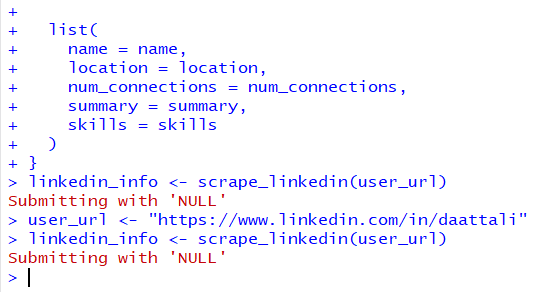Created
March 5, 2016 11:11
-
-
Save daattali/3868f67e60f477c8c0f0 to your computer and use it in GitHub Desktop.
Scraping Twitter and LinkedIn info in R
This file contains bidirectional Unicode text that may be interpreted or compiled differently than what appears below. To review, open the file in an editor that reveals hidden Unicode characters.
Learn more about bidirectional Unicode characters
| # Get a person's name, location, summary, # of connections, and skills & endorsements from LinkedIn | |
| # URL of the LinkedIn page | |
| user_url <- "https://www.linkedin.com/in/daattali" | |
| # since the information isn't available without being logged in, the web | |
| # scraper needs to log in. Provide your LinkedIn user/pw here (this isn't stored | |
| # anywhere as you can see, it's just used to log in during the scrape session) | |
| username <- "yourusername" | |
| password <- "yourpassword" | |
| # takes a couple seconds and might throw a warning, but ignore the warning | |
| # (linkedin_info <- scrape_linkedin(user_url)) | |
| ############################ | |
| library(rvest) | |
| scrape_linkedin <- function(user_url) { | |
| linkedin_url <- "http://linkedin.com/" | |
| pgsession <- html_session(linkedin_url) | |
| pgform <- html_form(pgsession)[[1]] | |
| filled_form <- set_values(pgform, | |
| session_key = username, | |
| session_password = password) | |
| submit_form(pgsession, filled_form) | |
| pgsession <- jump_to(pgsession, user_url) | |
| page_html <- read_html(pgsession) | |
| name <- | |
| page_html %>% html_nodes("#name") %>% html_text() | |
| location <- | |
| page_html %>% html_nodes("#location .locality") %>% html_text() | |
| num_connections <- | |
| page_html %>% html_nodes(".member-connections strong") %>% html_text() | |
| summary <- | |
| page_html %>% html_nodes("#summary-item-view") %>% html_text() | |
| skills_nodes <- | |
| page_html %>% html_nodes("#profile-skills .skill-pill") | |
| skills <- | |
| lapply(skills_nodes, function(node) { | |
| num <- node %>% html_nodes(".num-endorsements") %>% html_text() | |
| name <- node %>% html_nodes(".endorse-item-name-text") %>% html_text() | |
| data.frame(name = name, num = num) | |
| }) | |
| skills <- do.call(rbind, skills) | |
| list( | |
| name = name, | |
| location = location, | |
| num_connections = num_connections, | |
| summary = summary, | |
| skills = skills | |
| ) | |
| } |
This file contains bidirectional Unicode text that may be interpreted or compiled differently than what appears below. To review, open the file in an editor that reveals hidden Unicode characters.
Learn more about bidirectional Unicode characters
| # Make a wordcloud of the most common words in a person's tweets | |
| # Need to create a Twitter App and get credentials | |
| setup_twitter_oauth(USE_YOUR_CREDENTIALS_HERE) | |
| # Username of the Twitter user | |
| name <- "daattali" | |
| ##################### | |
| library(twitteR) | |
| library(SnowballC) | |
| library(wordcloud) | |
| library(tm) | |
| library(stringr) | |
| library(dplyr) | |
| user <- userTimeline(user = name, n = 3200, includeRts = FALSE, excludeReplies = TRUE) | |
| tweets <- sapply(user, function(x) { strsplit(gsub("[^[:alnum:] ]", "", x$text), " +")[[1]] }) | |
| topwords <- | |
| tweets %>% | |
| paste(collapse = " ") %>% | |
| str_split("\\s") %>% | |
| unlist %>% | |
| tolower %>% | |
| removePunctuation %>% | |
| removeWords(stopwords("english")) %>% | |
| #wordStem %>% | |
| .[. != ""] %>% | |
| table %>% | |
| sort(decreasing = TRUE) %>% | |
| head(100) | |
| wordcloud(names(topwordscloud), topwords, min.freq = 3) |
@JessicaRudd I'm getting the same error. I'm thinking many things have changed on LinkedIn in 2 years since this was posted...
@JessicaRudd @taraskaduk - sorry for not responding, github doesn't seem to send me messages when a comment gets posted on a gist.
This code was written in a rush for a hackathon a long time ago, it was not meant to be robust and stand a test of time. I'm sure that since then the linkedin website has changed enough that this doesn't work anymore, sorry! But hopefully this can still be a helpful starting point
Thanks @daattali.
Redirected to SO for help:
Sir i want scrap the career growth of an alumini of a college's linkedin profile. How can this be done.
hey, do you still need help with this?
Sign up for free
to join this conversation on GitHub.
Already have an account?
Sign in to comment

Cool script. Thanks for sharing. I've noticed several words in my cloud have letter 'c' stuck in front of them. Any ideas what causes that?